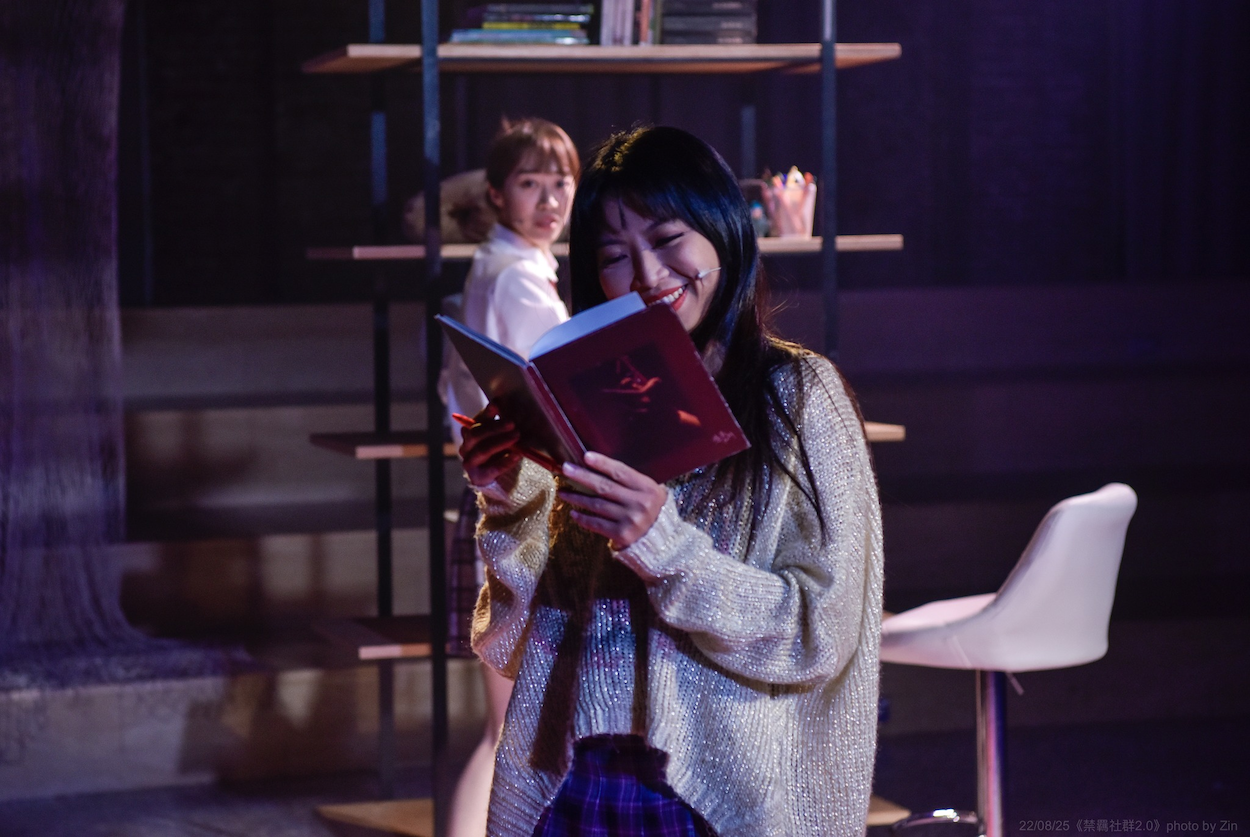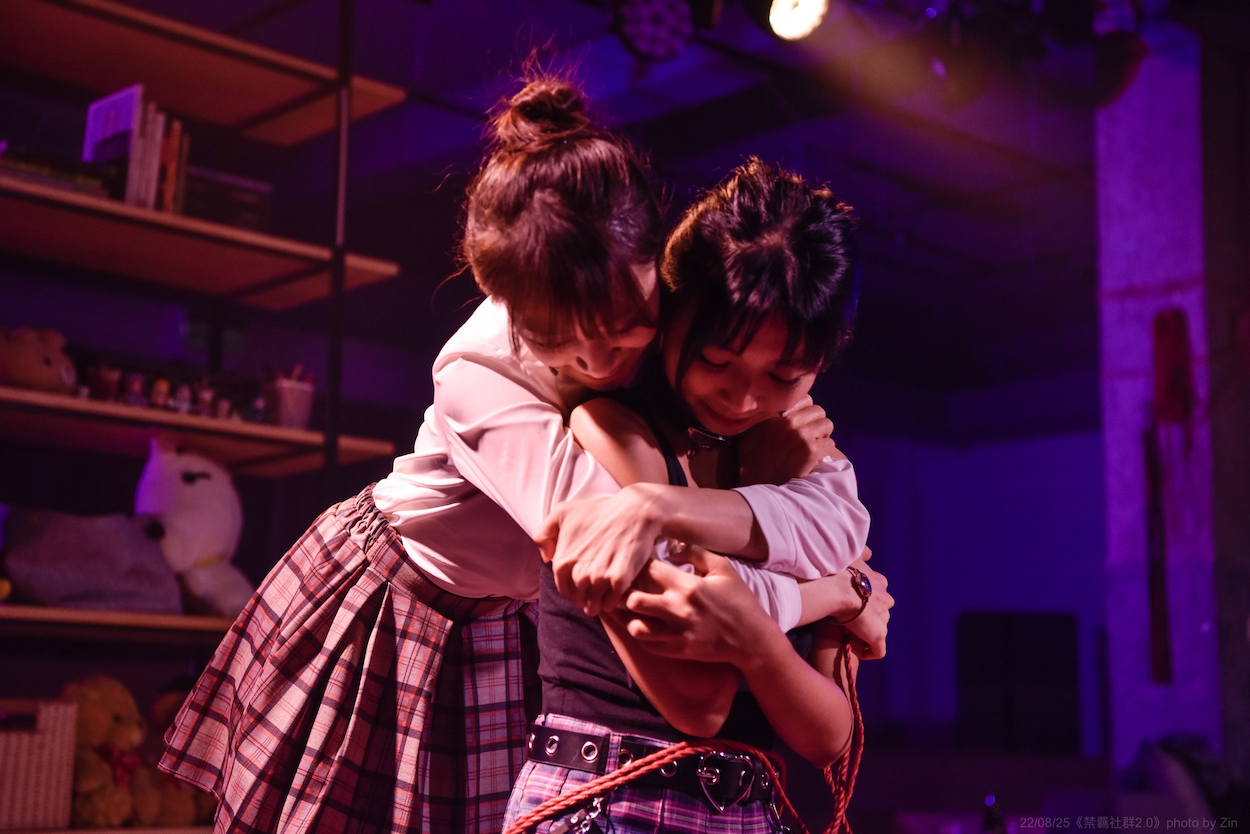by Daniel Yo-Ling
語言:
English
Photo courtesy of BDSM Company, taken by Zin Ge
[Note: This review contains spoilers]
THIS PAST WEEKEND, 皮繩愉虐邦 BDSM Company hosted four performances of “Kinky Community Musical 2.0″ (KCM2 or 《禁羈社群2.0》) at the Huashan 1914 Creative Park. Written by Della Wang (黛拉) and directed by HSIAO-I Lu (呂筱翊), “Kinky Community Musical 2.0” (KCM2) is a revised version of Wang’s first “Kinky Community Musical,” which debuted in late April 2019 just weeks before the legalization of same-sex marriage in Taiwan. Featuring mesmerizing rope-binding scenes, catchy tunes in the form of twelve original songs, and gripping script writing, KCM2 tells an intertwined love story of four main characters that pushes the boundaries of tongzhi politics to further incorporate Taiwan’s BDSM, asexual, and polyamory communities.
The musical starts in 2014 with teenager Jian Shao-lin (簡少琳, played by Sunny Huang 黃歆) and her high school entrance exam tutor Wang Shi-han (汪詩涵, played by Ya-Chu Chang 張雅筑), who is the founding president of her college’s BDSM club. Shao-lin has a huge crush on Shi-han, but Shi-han is in love with her master, senior rope top and tongzhi movement activist Chen Yi-fei (沈逸非, played by none other than musical writer and veteran BDSMer Della Wang herself). While Shao-lin and Shi-han are discovering their shared interests in BDSM, Yi-fei is comforting her friend, Ye Wen-hao (葉文浩, played by Chia-En Ho 何嘉恩), who has just been dumped by his partner after coming out to them as asexual.

Wang Shi-han (front) and Jian Shao-lin (back) go through a BDSM magazine together in the opening scene. Photo courtesy of BDSM Company, taken by Zin Ge
Fast forward four years later to fall 2018––the majority of the musical takes place between the November 2018 referendum and the legalization of same-sex marriage in May of 2019. During this time, Shao-lin and Shi-han reconnect while Yi-fei decides to marry a man–none other than her friend Wen-hao–in order to fulfill her terminally ill mother’s last wish, which creates extreme tension in Yi-fei and Shi-han’s relationship.
KMC2 both revolves around and far exceeds its setting during a critical historical juncture in Taiwan’s tongzhi movement. During the lead up to the November 2018 referendum, the entire cast is on stage together singing a hopeful score entitled “New Generation, New World.” The lyrics of this song make explicit reference to various tongzhi movement group’s support for gender equity education and same-sex marriage legalization, such as the Taiwan Alliance to Promote Civil Partnership Rights’ “Two Good, Three Bad” voting slogan (“兩好三壞 投出幸福未來”), Taiwan Asexual Group’s call for supporting testimonies (“無性戀小組發起徵文活動”), as well as various BDSM groups who signed a joint-statement of support (“BDSMer發表聯合聲明”). This scene clearly locates the BDSM and asexual communities within the mainstream tongzhi movement.
While singing “New Generation, New World,” Chen Yi-fei rides a couch pushed by the other cast members and waves a Taiwan rainbow flag to symbolize their collective investment in and support for the mainstream tongzhi movement during the November 2018 referendum. Photo courtesy of BDSM Company, taken by Zin Ge
Yet the musical as a whole moves past simply regurgitating a hackneyed progress narrative of same-sex marriage legalization in Taiwan by focusing instead on the complex emotional and romantic lives of its four main characters, three of which serve as entry points into BDSM (Shao-lin), asexuality (Wen-hao), and polyamory (Shi-han).
KMC2 is written for a broad audience and serves as an introduction to BDSM for the uninitiated. For example, during the BDSM performance scene halfway through the musical, Yi-fei invites a random audience member onto the stage and demos a live spanking session, methodically walking the audience through how to properly enter (“What kind of experience do you want to have? Do you have any old injuries or sensitive areas I should know about? Are there any parts of your body you do not want me to touch?”) and exit (“How do you feel now? Did that experience meet your expectations?”) a scene. This welcomed didacticism can be seen throughout the musical in places such as its recurring theme song, titled “What is BDSM?”, and especially in the character of Jian Shao-lin, who is a young and passionate student encountering and exploring BDSM for the first time. In the opening scene, Shao-lin enthusiastically yet somewhat clumsily ties up Shi-han. When Shao-lin begins to untie Shi-han at arms length, Shi-han corrects her by pulling her in closer and maintaining body contact, teaching both Shao-lin and the audience that the intimacy of a session extends into and beyond its conclusion.
Following Shi-han’s (front) guidance towards the end of the opening scene, Shao-lin (back) simultaneously embraces and unties her. Photo courtesy of BDSM Company, taken by Zin Ge
Though BDSM is clearly the focal point and aesthetic center of the musical, KMC2 also provides a tender exploration of asexuality through the character of Ye Wen-hao. The first half of the musical spends a considerable amount of stage time establishing Wen-hao’s friendship with Yi-fei. For instance, in the beginning of the musical when Wen-hao is devastated by his partner of six years dumping him after coming out as asexual, Wen-hao sits on Yi-fei’s couch and shares with her that the last thing his ex told him was that “they will never be happy together” (“我們不會幸福”). Wen-hao then meekly requests that Yi-fei tie him up as a way for her to accompany him in his sorrow. This rope-binding scene, which happens simultaneously and in contrast with the fresh enthusiasm and warm lighting of Shao-lin’s first rope tying experience discussed above, is tonally much more blue and feels heavier, weighted by Wen-hao’s pain but also propped up by the solid foundation of his friendship with Yi-fei. Towards the end of the scene, Wen-hao exclaims that the experience was “very therapeutic” (“很療癒”).

Yi-fei (back) gently wraps both her arms and a red hemp rope around Wen-hao’s (front) upper body. Photo courtesy of BDSM Company, taken by Zin Ge
Less explicitly, KMC2 also explores polyamory through Shi-han’s character arc. After the 2018 referendum defeat, Shi-han finally convinces Yi-fei to date her. However, she is soon consumed with jealousy as Yi-fei continues to relate intimately with others. For instance, during the BDSM performance scene halfway through the musical, Shi-han is utterly distraught after seeing how Yi-fei interacts with her deaf performance partner Song Ying-ying (宋穎穎, played by dancer Kai Ning Chung 鍾凱甯) during a suspension bondage routine and subsequently breaks up with Yi-fei. Shi-han’s internal character conflict draws attention to the complex topic of how to acknowledge and navigate feelings of jealousy in polyamorous relating, a perennial discussion topic within poly circles. Importantly, at no point does the musical condemn Shi-han for her feelings of jealousy; instead, RMC2 invites the audience to both sympathize with Shi-han and transform with her.
Shot of Yi-fei (center back) untying Ying-ying (center front) after their suspension bondage routine with Shi-han (left) and Shao-lin (right) singing to the audience. Photo courtesy of BDSM Company, taken by Zin Ge
Perhaps the most shocking yet intriguing feature of KMC2’s plot is that Yi-fei and Wen-hao actually do end up getting married. Despite clearly aligning with the mainstream tongzhi movement and telling the history of same-sex marriage legalization in Taiwan, KMC2 chooses instead to feature a mixed-orientation platonic marriage between an asexual man and a lesbian woman. Far from reproducing a happily-ever-after gay marriage trope, Yi-fei and Wen-hao’s marriage scene opens up a performative space for public recognition of platonic partnerships, something of monumental importance to Taiwan’s asexual community. According to the results of Taiwan Asexual Group’s 2021 Taiwan Ace Community Survey (n=397), over 60% (n=116) of asexual-identified respondents (n=197) responded that, in their ideal intimate partnership scenario, they would like to enter into a platonic partnership. KMC2 seems to be aware of its own significance in this regard, as the pace of the musical slows down during the marriage ceremony and features Yi-fei and Wen-hao holding hands walking down a long red carpet aisle together. This slower pace gives the audience ample time and space to reflect on the scene.

Shot of Wen-hao (left) and (Yi-fei) at their wedding. Photo courtesy of BDSM Company, taken by Zin Ge
Technically speaking, Yi-fei and Wen-hao’s marriage builds plot tension rather than resolves it. The marriage scene, beautiful and meaningful in its own right, is also the plot device used to bring Shi-han and Yi-fei’s relationship conflict to a head. Immediately after the wedding, Shi-han gives her collar to Wen-hao to return to Yi-fei, effectively terminating their pet/master relationship. The musical’s final resolution comes shortly thereafter when, under Shao-lin and Wen-hao’s insistence, Shi-han and Yi-fei reconcile with each other and resume both their pet/master and dating relationship; at the same time, Shi-han, who has finally come to accept polyamory, also develops her budding partnership with Shao-lin. Ultimately, KMC2’s happily-ever-after revolves around Yi-fei’s ability to finally realize her familial, platonic, and romantic loves and Shi-han’s eventual embrace of Yi-fei, Shao-lin, and polyamory. The musical ends with Wen-Hao telling Shi-han that the house that he and Yi-fei bought together has a room specifically for her, with Shao-lin suggesting to Shi-han that they move-in together.
Yi-fei (left) and Shi-han (right) reconcile with each other and passionately kiss towards the end of the musical. Photo courtesy of BDSM Company, taken by Zin Ge
A compelling exploration of pleasures, intimacies, and relationships that are both a part of and exceed traditional mainstream tongzhi politics, KMC2 is equal parts entertaining, enchanting, and edifying. In particular, KMC2’s treatment of marriage has interesting implications for LGBTQ+ advocacy in Taiwan. By both clearly supporting same-sex marriage and simultaneously foregoing it as a point of catharsis, KMC2 occupies a productive space of possibility at the ostensibly intractable schism between ‘mainstream tongzhi’ politics and ‘radical queer’ politics in Taiwan, between same-sex marriage proponents and the (US-centric) critique of homonormativity/homonationalism. In fact, the main subjects explored throughout the musical (BDSM, asexuality, and polyamory) do not fit neatly on either side of this binary. In a moment where the mainstream tongzhi movement is still fighting for transnational same-sex marriage, same-sex co-adoption rights, and access to assisted reproductive technologies, KMC2 suggests an ethics of tongzhi solidarity that is both supportive of these endeavors and simultaneously insists on the radical queer potential of kink, ace, and poly approaches to pleasure and intimacy for bringing about a more inclusive society.
In his latest monograph, Transtopia in the Sinophone Pacific (2021), Taiwanese gender studies scholar and historian of sexuality Howard Chiang makes the argument that, at least since the early 2000s, tongzhi politics in Taiwan have evolved to incorporate transgender and gender diversity issues and hence cannot be interpreted as exclusively referring to the interests of gays and lesbians. KMC2 makes a similar aspirational argument in the contemporary period, but with BDSM, asexuality, and polyamory. It remains to be seen how and whether the boundaries of tongzhi politics can be fully reworked to further incorporate the stories, interests, and desires of Taiwan’s BDSM, asexual, and polyamory communities. KMC2 gives us a glimpse of this possibility.

The entire cast (Shao-lin, left; Wen-hao, center left; Ying-ying, center; Yi-fei, center right; Shi-han, right) standing and singing together in the final scene of the musical. Photo courtesy of BDSM Company, taken by Zin Ge
This past weekend’s performances of Kinky Community Musical 2.0 had only about 10% of its total budget sponsored by the Ministry of Culture. Wang mentioned at the end of the show that she intends to continue working on this musical in the future, but needs to first secure additional funding. If you enjoyed reading this review and would like to financially contribute to making a Kinky Community Musical 3.0 happen, you can send money via PayPal directly to Della Wang or contact her via Facebook.







